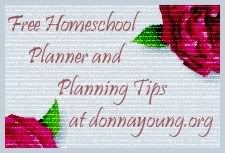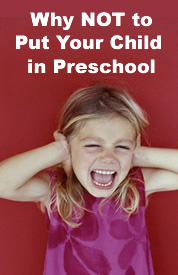The Basics Of Homepreschool: Starting Early? Curriculum, Methods and More
Posted by homeschoolmentormom on September 3, 2014
How to Start Children Early—Curriculum, Methods, etc:
First of all, I have to make it clear that starting homepreschool–a deliberate, set-aside time to help our preschoolers learn–does not mean it is time to start formal academics. Study after study have shown that the current push-down in curriculum just doesn’t work. No study has shown any benefit at all to learning to read at age five or younger, versus learning to read at age 6, 7, or older—and in fact, studies have shown that children who learn to read later not only learn to read more quickly and easily than other children do, but they do better academically throughout their entire lives. This is because they spent their early years learning and doing real things instead of concentrating solely on formal academics.
Preschoolers should spend lots of time being read to, playing with science, taking nature walks, doing art, listening to music, singing, and playing, playing, playing! All these activities boost thinking skills, creativity, and vocabulary, and THAT benefits them throughout their whole lives. (This is true, meaningful learning for preschoolers. See the tab, “Goals of Homepreschool” and “Goals for the Balanced Mom” for more.)
Preschoolers don’t need “curriculum” as we’ve come to think of it, either. For preschoolers, life itself is the curriculum. Preschoolers can learn about science—plants, animals, weather; social studies—communities and community helpers; art; music; pre-reading skills; social skills; sport/physical skills; speech/language skills and pre-math skills—all through having parents who talk to them, read aloud to them, play with them, and provide real life experiences for them. (Don’t make the mistake of concentrating only on formal academics and “readiness” skills, when there is so much more that preschoolers can and should learn! See my tab on “Readiness” and “The Truth: Early Academics” for more, including links to research on the subject.)
How to Get Started
The best way to start homepreschooling is not by running out and buying workbooks for your preschooler, as I stated above. Workbooks are not developmentally appropriate for most preschoolers. Instead, start by establishing a simple daily routine for that includes a story time, art, music, and so on. If you want to, you can decide ahead of time what you’d like to read to your children about—choose themes or units, and then run to the library and find all the picture books you can about the subject. Then, simply read, read, read. If and when you can, throw in activities that go along with what you are learning about. For instance, when you do a farm unit, visit the grocery store and talk about how and where things grow; buy some whipping cream and shake it up to make butter. When you learn about zoo animals, visit a zoo. When you learn about community helpers, visit the police station and the airport, and so on. There are many “homepreschool” co-ops and homeschool support groups that offer these types of activities or “field trips”. (See my archives on unit studies for more.)
Methods: The Importance of Reading Aloud, Conversation, and Playing with Our Children
Reading aloud is the single most important thing parents can do to help their children learn, no matter their age. When you read to your child, you are teaching more than just the content of the book. You are teaching them about language, letters and print—that letters make sounds, and sounds make letters; you are also teaching them that we read from top to bottom and left to right. You are teaching them about grammar, vocabulary, and rhyme. You are growing their attention span, speech skills and more. {For more, see my tab, “Reading Aloud” and the archives on reading aloud and book lists.}
Conversation is vitally important to learning. Conversations always include the skills of listening, and then responding, which is different from just “talking at” our children. We can use conversations to build relationships with our children, to teach our children, and to facilitate their learning
Playing With Our Children:
It is important to watch our children’s play AND play with them. By watching their play, we can detect new behavior problems and nip them in the bud; we can discern their emotional state, and help them where needed; we can take advantage of teachable moments, and we can learn about their health (observing children’s play/behavior allows us to catch illnesses early.) Best of all, playing with our children builds close relationships and is tons of fun! {See my article, “Why Preschoolers Need to Play” for more, including links to research about the importance of play.}
Next time: Important Skills to Develop, Fun and Games!
© 2010, 2011, 2014 Susan Lemons all rights reserved. Portions of this post are taken from or similar to passages in Homepreschool and Beyond, used by permission of the author. Copyrighted materials may not be re-distributed or re-posted without express permission from the author.






Leave a comment